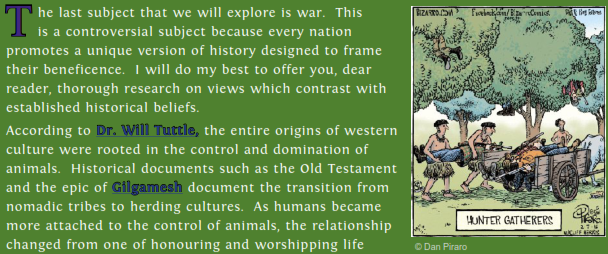Political Conflict

- to one of seeing animals as possessions and a form of currency. This culture became more powerful through domination of other humans and eventually came to conquer all nearby cultures in Europe and the Mediterranean. (link) This greed for wealth caused an evolution toward the domination of land and eventually to domination of elements consumed by humans (termed ‘resources’). The resource wars eventually came to encompass not just elements used for sustenance but to precious metals and finally to fuel sources.

What is less well known is that for over a century, the most destructive wars that we’ve ever seen have been tied to oil. At the turn of the 20th century, both Britain and Germany were converting their navy from coal to oil fuel. Both nations were vying for control of the Iraq oil fields as a rich source of fuel (sound familiar?). Britain through the Anglo-Persian oil company (now BP) and Germany through the Berlin-Baghdad railway. It was this competition and the alliances linked to the power struggle which helped set off the first ‘great war.’ (link) In the years leading to the second World War Hitler spent vast resources supporting Germany’s artificial oil program since the country had no natural oil fields (Britain had put a halt to Germany’s railway). It was only with the assurance of a reliable fuel source that Hitler felt confident enough to launch the first Blitzkrieg.
Meanwhile Japan decided to attack Hawaii only after the U.S. imposed an embargo on it’s oil supply. After the attack, Japan immediately moved to control Vietnam and the Indonesian oil fields. (link). Unknown to most people, oil was also the cause for the only direct control of U.S. soil by Japan during the war. (link) After the war’s conclusion the U.S. and Britain orchestrated an overthrow of the Iranian government in order to prevent Iran’s Prime Minister from reducing access to their oil supply. (link)

In 1984 the Iran/Iraq war expanded to include shipping of oil in the Persian Gulf. This threatened western supply lines and the U.S. got involved in an embarrassing political situation. (link)
In the modern age, less powerful countries all over the world have suffered huge political upheavals due to this almost ubiquitous addiction to fossil fuels. (link). U.S. forces fighting in Afghanistan have lost one person, killed or wounded, for every 24 fuel convoys it runs. During the U.S. war in Afghanistan, hundreds and hundreds of these convoys were needed to truck fuel – to run air-conditioners and power diesel generators – to remote bases all over Afghanistan. (link) Since the 1890s, the political leadership of the entire Middle East region has been dictated by Britain and later the United States because of these countries’ reliance on oil for heating, industry, and transportation. If you think, dear reader, that these oil conflicts are merely a product of American— European resource grabs then I welcome you to read on here. The whole region of southeast Asia has recently been in an uproar near the Senkaku and Huangyan island chains. The conflict of course was only sparked after the discovery of oil in the region.
There is no question that battles over the really essential resources are being fought throughout the world. (link) However they often fall under the radar because there aren’t expensive jet fighters and missiles involved. The huge disparities around both water and food distribution favour the countries with enough money and fuel to maintain military control. The enormous populations which are denied basic needs because of the resources given to animals inevitability causes even more world conflict.






